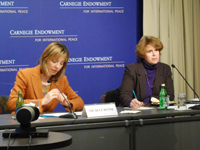Registration
Thank you!
You will receive an email confirming your registration.
Opposition activity is heating up as Egypt moves closer to parliamentary elections on November 28. But as voters prepare to head to the polls, the Egyptian government has tightened restrictions on independent media and civil society, and has already disqualified one-quarter of the Muslim Brotherhood’s candidates. It remains unclear to what extent domestic or international monitors will be allowed to observe the elections.
Carnegie’s Amr Hamzawy and Michele Dunne discussed the high stakes of Egypt’s upcoming elections. Jennifer Windsor, the associate dean for Programs and Studies at the School of Foreign Service at Georgetown University, moderated the discussion.
The Electoral Landscape
Dunne began the discussion by analyzing some of the institutional and political differences between the upcoming November elections and Egypt’s 2005 parliamentary elections:
- Limited pluralism: As in 2005, the upcoming elections for the People’s Assembly, or parliament, will be characterized by fierce competition among a “plethora” of candidates, Dunne said. While more than 5,000 candidates are running in the election, Dunne stressed that the People’s Assembly itself “carries relatively little weight within a political system that is still dominated by the executive branch.” Additionally, restrictions on campaigning—such as the prohibition on religious slogans—have constrained the activities of opposition parties and movements such as the Muslim Brotherhood.
- Administrative and legal changes: The major political players–including the ruling National Democratic Party (NDP), the Muslim Brotherhood, the Wafd party, and a substantial bloc of independent candidates–remain the same as in 2005, but the legal and institutional framework in which they will compete has undergone important modifications, Dunne explained. Constitutional amendments introduced in 2007 reduced the scope of judicial supervision of the electoral process. Before these revisions, the Law on Political Rights had required that a sitting judge be physically present at every polling station to monitoring voting and counting procedures. But the controversial amendments removed this requirement and created a new supervisory body, the Higher Electoral Commission (HEC), which exercises oversight over all local voting and counting processes through its subsidiary sub-committees.
- Additional seats for women: With the addition of 64 seats reserved for female members of parliament, the size of the People’s Assembly has increased from 444 seats in 2005 to 508 seats in 2010. Hamzawy said that the introduction of a gender quota has had a positive impact on the participation of female candidates, noting that an unprecedented 379 women will seek office on November 28.
- Internal divisions: The pre-election period has seen the emergence of deep divisions within opposition parties and within the ruling NDP itself, Hamzawy stated. Opposition forces such as the Muslim Brotherhood and the Ghad party were internally divided over the question of whether or not to join the electoral boycott advocated by Mohammed ElBaradei’s National Association for Change, but ultimately chose to field candidates. Meanwhile, the NDP was unable to impose discipline on its ranks, leaving the party with 800 candidates seeking 508 seats.
Obstacles to Neutral Supervision
Dunne and Hamzawy both questioned the HEC’s neutrality. The commission approves the registration of candidates as well as the accreditation of election monitors. Its likely institutional bias in favor of the ruling party could impact the integrity of the electoral process.
- NDP influence: Since the HEC is partially appointed by the People’s Assembly, its composition inevitably reflects the preferences of the ruling NDP’s parliamentary majority, Dunne said.
- Reduced oversight: Whereas supervising judges played an important “watchdog role” in the 2005 parliamentary elections, their reduced involvement in administering this year’s election means that voting and counting processes will not be scrutinized as closely, said Dunne.
- Rejection of international monitoring: The Egyptian regime has rejected calls for international monitoring, arguing that such oversight would constitute an infringement on Egypt’s national sovereignty.
- Restrictions on domestic monitors: The government has permitted domestic civil society groups to apply for permits to monitor elections, and over 10,000 Egyptian observers have submitted applications thus far. Even if these domestic observers successfully obtain accreditation, Hamzawy warned that local officials could still bar them from entering polling places on the day of the election, as occurred during the June 2010 Shura Council election.
Expectations for Election Day and Beyond
- Potential violence and intimidation: The current atmosphere of intense competition is conducive to outbreaks of violence. According to Dunne, Alexandria is emerging as a potential hot spot, due to recent high-profile cases of police brutality and the controversial exclusion of 55 of the district’s Brotherhood candidates. Many candidates hire people to intimidate supporters of their political rivals, a tactic that also increases the likelihood of violence.
- Exclusion of voters and monitors: In the 2005 parliamentary elections, police formed security cordons around polling places in highly contested districts, which prevented many voters and monitors from accessing the sites. Similar incidents could hinder voter turnout and monitoring activities on November 28, Dunne said.
- Ramifications for the 2011 presidential election: The results of this year’s parliamentary election will shape the political scene leading into the 2011 presidential race. Dunne explained that only parties that win seats in the People’s Assembly will be eligible to nominate a presidential candidate next year, so the November 28 election could limit the pool of presidential contenders.
- The U.S. response: A recent statement by the State Department, affirming the U.S. commitment to free and fair elections in Egypt, has provoked a backlash from Egyptian officials who strongly oppose external interference in the country’s domestic political affairs. The post-election period offers the Obama administration a crucial opportunity to clarify its support for political reform as Egypt approaches an inevitable political succession. According to Dunne, “The next president of Egypt is already on the scene and listening to these messages.”
